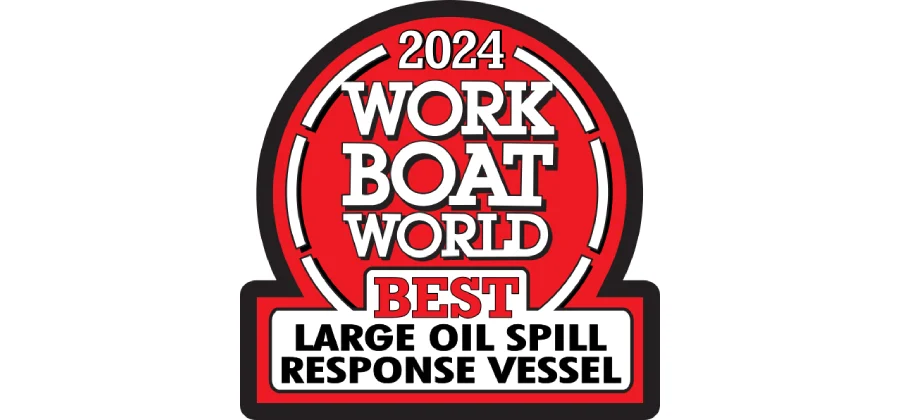AWARDS 2024 | Best Large Oil Spill Response Vessel – Allison Creek – Elliott Bay Design Group
Designed by Elliott Bay Design Group of Seattle, Washington, this large and effective barge has been designed for a life of public service as a receptacle for oil that may be spilt from or around the massive Alyeska oil pipeline development.
The barge operates in conjunction with tugs and skimmers that assist it to collect any spilt oil. With a capacity of 13,600 barrels of oil, the barge should be able to dispose of even a huge spill of the Exxon Valdez size. Allison Creek may look like a simple barge, but a closer examination reveals a complex design.
"What makes Allison Creek special is its advanced engineering, which includes high-capacity skimmer cranes, water-segregating cargo systems, and ample deck space for efficient boom deployment," Michael J Complita, Vice President for Strategic Expansion at the Elliott Bay Design Group (EBDG), told Baird Maritime.
"EBDG provided the design and regulatory support to ensure the vessel meets the highest standards, reinforcing Alaska’s ability to respond to environmental emergencies with speed and precision."
Complita explained that, in general, the project proceeded smoothly all throughout, though the most significant challenge was in packing a similar suite of features and capabilities as the owner has on its 120,000-barrel class oil spill response barges (OSRBs) into a much more compact hull to serve confined areas where larger vessels are incapable of operating.
"As the maritime industry evolves, innovation is being driven by both regulatory pressures and the need for smarter, more sustainable operations," said Complita.
"Emissions reduction, efficient operation and both capital and operating cost reduction are all key focus areas in the commercial maritime space around the world. Adoption and marinisation of emerging technologies for safe and reliable use onboard vessels is also trending."
Complita called 2024, "a strong and exciting year for EBDG," as marked by the company's involvement in a number of major projects including the design and construction of several new hybrid passenger/vehicle ferries that will soon enter service across the United States as well as a long-range towboat that would meet IMO 2030 emissions requirements.
"With this momentum, we’re very optimistic about both our future and the direction of the maritime industry as a whole."
Complita said EBDG is also supporting ports and vessel operators in their efforts to reduce emissions through feasibility studies and solutions like the company's patent-pending clean harbour alternative mobile power (CHAMP) barge, a mobile, floating platform that provides vessel charging capabilities while in port.
In Complita's view, conventional at-berth shore power is logistically impractical and cost prohibitive for many ports, while barge-based alternatives such as "stack capture" provide an effective alternative in certain applications.
"Our CHAMP barge offers a more flexible option that also directly addresses the growing need for port infrastructure resiliency and lower cost electric vessel charging," he told Baird Maritime. "Singular solutions that address multiple needs of an operator or port [in reducing] both cost and complexity will be in high demand."
Complita explained that EBDG anticipates continued technology development and wider adoption of alternative fuels as key drivers shaping the US maritime industry over the next few years. Thus, the company expects to see more operators evaluating the long-term value of hybrid, battery-electric, hydrogen, and methanol-powered vessels.
"Sharing our own lessons learned with other early adopters will be essential, not only to refine these technologies but also to establish best practices for integration, safety, and operations," said Complita.
"The industry is moving toward smarter, cleaner, and more resilient solutions, and we’re committed to supporting clients as they navigate this transition."
For a list of the 2024 "Best Of" award winners, please click here.




